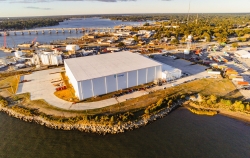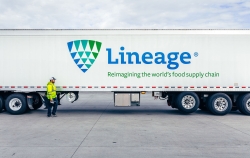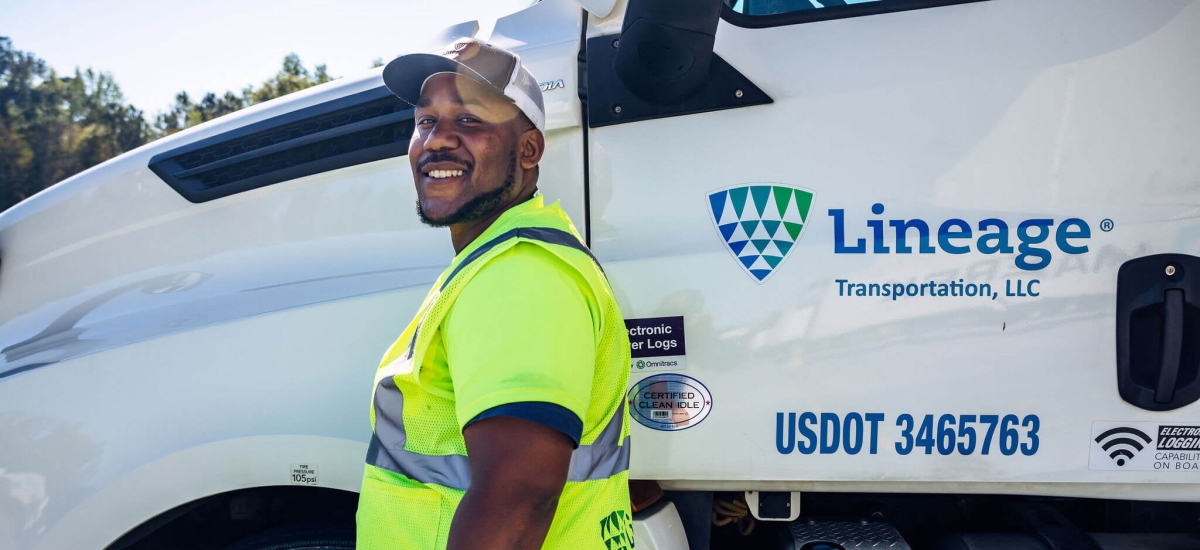Transportation and Redistribution Connects Supply to Demand
Cold Chain 101: Exploring the Cold Chain, One Link at a Time
April 17, 2024
The global food supply chain is one of, if not the, most complex and important systems humanity has ever developed. From the first step of food processing and manufacturing, to storing the food in cold storage warehouses, to transporting and redistributing food all around the world, this integral structure is all about connecting people from around the world with the food they need. The incredible complexity and sheer number of moving parts involved in the supply chain means that it can be susceptible to dramatic shifts in cost. The component that’s most prone to change is transportation.
As recently as 2021, U.S. transportation costs in logistics were in the ballpark of $1.2 trillion, for motor carriers alone, which only make up a fraction of the freight transportation sector. Factor in transportation via rail and overseas freight shipping, and it’s easy to see how important it is to strategize modes of transportation. That’s why, at Lineage, we emphasize smart strategies and diversification when it comes to transportation and redistribution.
By Sea – Optimizing the World’s Most Popular Transportation Mode
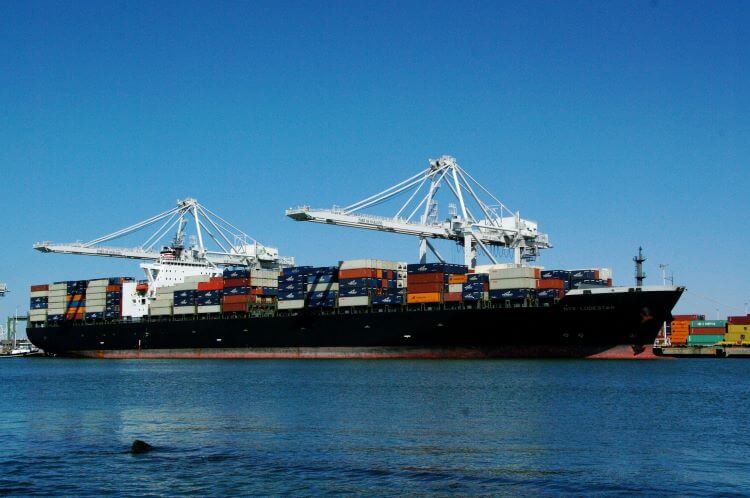
When it comes to global food transportation, ocean freight is king. Nearly 60% of global food shipping happens by sea, which equates to billions of tons of food crossing the sea each year. For companies working in the supply chain, that means managing the complexities of these global shipments is a top priority. This complex system relies on effectively coordinating variables like customs brokerage, port drayage and integrating inland transportation modes once these food products reach shore. Not only that, but all of this needs to happen in a timely and efficient manner to ensure the safety and integrity of the food being transported. It’s because of this that international ports have become a central hub in the global food supply. Ports act as vital nodes in our cold chain, connecting food from all over the world to the people who need it.
Lineage takes on this challenge with a robust and comprehensive suite of essential, port-focused services aimed at fostering overall efficiency and safety throughout the journey.
Lineage Sea Transportation and Port Services Include:
- Port-Centric Warehousing: Strategically located warehouses streamline access to global markets by seamlessly combining access to inland transportation modes, comprehensive drayage, customs brokerage and onsite USDA inspections.
- Customs Brokerage: Expert customs brokerage services and specialized in-house teams at major U.S. ports help facilitate efficient clearance, ISF filings and inspections.
- Drayage: Efficient port-based container drayage services link domestic warehouses and ocean transportation with our diverse offerings of inland transportation modes.
- Freight Forwarding: As an Authorized Economic Operator (AEO), Lineage works as a single-point provider for exporting and importing with customs and transportation support.
By Road – Trucks Connect the Global Food Supply to Your Town
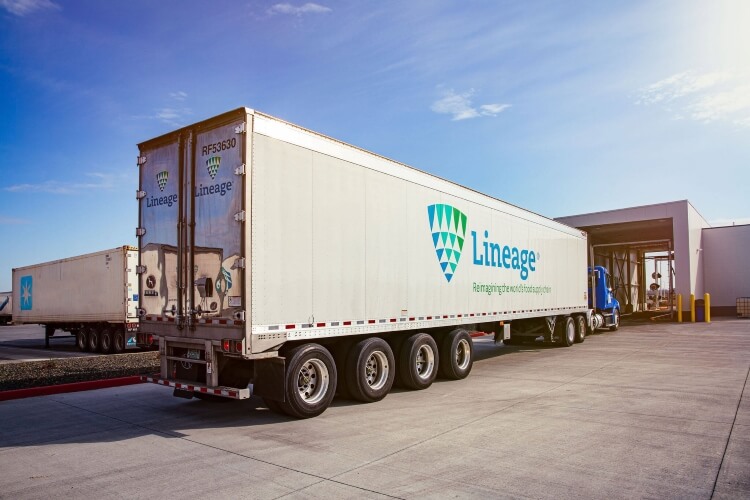
The journey of food doesn’t end at the dock. When it comes to inland food transportation, wheels on the road still reign supreme. As recently as 2023, more than 13 million tons of food were transported by truck. This incredible migration of food across the land is made possible by a combination of intricate transportation plans, efficient scheduling and robust networks of professional drivers and temperature-controlled trucks. Some of these strategies include optimizing load matching and focusing on the middle mile to reduce less-than-truckload (LTL) costs. At the end of the day, it’s all about improving overall supply chain efficiency while maintaining food safety standards. Last mile delivery, despite being the most visible part of the supply chain, is often one of the highest costs because of operational and labor demands.
Addressing these costs requires a partner who utilizes innovative approaches to streamline this elaborate phase of transportation.
Lineage Road Transportation Services Include:
- Managed and On-Demand Transportation: Flexibly managed and on-demand transportation solutions across a variety of modes utilizes connected management systems and data science to optimize freight and enhance delivery speeds.
- Multivendor LTL Consolidation: Lineage Retail Consolidation intelligently combines freight with others to help reduce costs and delivery times.
- Supply Chain Engineering: Data driven insights and analytics helps Lineage streamline the supply chain from start to finish by uncovering hidden costs, optimizing inventory and adapting to industry changes.
By Rail – Bringing Sustainability to the Food Supply Chain
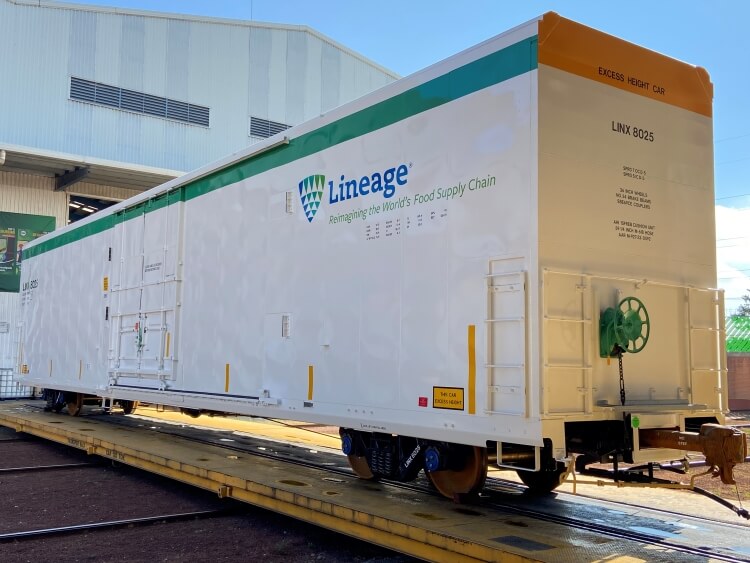
Rail transportation is a widely underleveraged mode that provides a sustainable and efficient alternative for moving large amounts of food over long distances. Every year, nearly 1.6 million carloads of grain and 1.7 million carloads of food products are transported by rail across the United States. Rail’s ability to carry exponentially more food than trucks not only provides a cost-effective alternative, but also reduces the overall carbon footprint of transportation. The biggest challenge for companies looking to add rail to their transportation mix is finding a provider with a stable and available fleet of refrigerated and insulated rail cars to maintain the precise temperature requirements needed to transport various food products.
To effectively incorporate rail into a transportation portfolio, it’s essential to find a partner who specializes in this niche method of moving food.
Lineage Rail Transportation Services Include:
- Fleet of Refrigerated and Insulated Rail Cars: Lineage boasts one of the largest private fleet of refrigerated and insulated rail cars in North America, with 2500+ boxcars, 1500+ mechanical reefers and 1200+ super-insulated boxcars.
- Rail Management Programs: Lineage provides detailed insights into rail transportation, including daily tracking, expedited rail movements, freight billing services and in-depth economic and operational analyses.
Wrapping Up Cold Chain 101: Transforming the Food Supply Chain with Strategic Partnerships
Strategic, informed decisions and aligning with a vigilant and forward-thinking partner can transform the supply chain into a streamlined, sustainable journey. With Lineage leading the way with innovative and comprehensive transportation solutions by sea, by road and by rail, our food’s journey through the cold chain becomes more manageable, efficient and sustainable.
Wrapping up the Cold Chain 101 journey, we've done a deep dive into the incredible complexities of humanity’s grandest innovation: the global food supply chain. From food processing and cold storage warehousing to transportation and redistribution, this intricate system connects people to food all around the world. For more information on how partnering with Lineage can lead to a more efficient and cost-effective supply chain for your organization contact us today!
